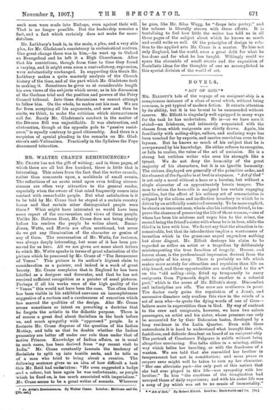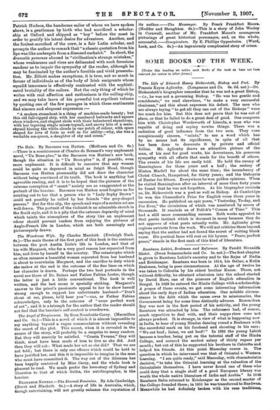NOVELS.
"ACT OF GOD." • Mn. ELLscrres tale of the voyage of an emigrant-ship is a conspicuous instance of a: class of novel which, without being common, is yet typical of modern fiction. It extorts attention by its ability, but it is too brutal to be commended without reserve. Mr. Elliott is singularly well equipped in many ways for the task he has undertaken. He is—so we have seen it stated—an Irishman, and intimately acquainted with the classes from which emigrants are chiefly drawn. Again, his familiarity with sailing-ships, sailors, and seafaring ways has been vouched for by experts, and carries conviction even to the layman. But he knows so much of his subject that he is overpowered by his knowledge. He either refuses to recognise, or fails to realise, the value of the art of omission. He is a strong but ruthless writer who uses his strength like a tyrant. We do not deny the humanity of the great majority of his characters, but it is an ignoble humanity. The virtues displayed are generally of the primitive order, and the element of the eqpn7,8es is at best in abeyance. "Act of God" is not only a novel without a hero or a heroine, but without a single character of an approximately heroic temper. The man to whom the beau-vole is assigned has certain engaging qualities, but the effect of his solitary act of renunciation is eclipsed by the odious and ineffective treachery to which he is driven by an artificially contrived necessity. To be more explicit, he shoots an innocent man, who is also his intimate friend, to im- prove the chances of preserving the life of three women,—one of whom has been his mistress and urges bins to the crime, the second being the friend's sister with whom he is in love, while the third is in love with him. We do not say that the situation is in- conceivable, but that its introduction implies a wantonness of invention which in the gruesome sequel engenders nothing but sheer disgust. Mr. Elliott destroys his claim to be regarded as either an artist or a tragedian by deliberately misinterpreting the true function of tragedy. Horror, and horror alone, is the predominant impression derived from the catastrophe of his story. There is probably no life which makes more acutely for attraction and repulsion than life on ship-board, and these opportunities are multiplied to the nth on the "old sailing - ship, fitted up temporarily to carry emigrants from Plymouth deptot to another in a colonial port," which is the scene of Mr. Elliott's story. Discomfort and indiscipline arc rife. The crew are mutineers in posse. The doctor early gains the reputation of a Jonah, and successive disasters only confirm this view in the minds of a set of men who—to quote the dying words of one of them— believe more in superstition than in God. By way of contrast to the crew and emigrants, however, we have two saloon passengers, an artist and his sister, whose presence can only be accounted for by their Bohemian tastes, developed by a long residence in the Latin Quarter. Even with these
antecedents it is hard to understand what brought this rich, fastidious, and delicate decadent on board of an emigrant-ship The portrait of Constance Palgrave is subtle without being altogether convincing. She talks either in a mincing, stilted' way which belies her breeding, or with the frankness of a wanton. We are told that she resembled her brother in
temperament but not in constitution; and mens prase in corpore sane might well be taken to sum up her character.
"Her one altruistic part—the only part of this nature that she bad ever played in this lifo—was sympathy with her brother." In Lim "the emotions of the imagination had usurped those of daily experience; and with his sister life was a song of joy which was set to no music: of immortality."
• "Act of God.- By Hobert Elliott. Loud= : Duckworth ani Co. [63.1
Patrick Hudson, the handsome sailor of whom we have spoken above, is a gentleman by birth who had sacrificed a scholar- ship at Oxford and shipped as "boy" before the mast in order to gratify his latent desire for adventure. Another, and the foulest-mouthed of the crew, is a fair Latin scholar, and prompts the author to remark that "a classic quotation from his lips was like ambergris from a diseased cachalot." In short, the
dramatis personae abound in "civilisation's strange mistakes,"
whose weaknesses and vices are delineated with such ferocious candour as to impair the sympathy of the reader, although he may be fascinated by the author's forcible and vivid presenta- tion. Mr. Elliott makes exceptions, it is true, not so much in favour of individuals as of the body of Irish emigrants whose squalid innocence is effectively contrasted with the sophisti- cated brutality of the sailors. But the only thing of which he writes with real affection and enthusiasm is the sailing-ship, and we may take leave of his powerful but repellent volume by quoting one of the few passages in which these sentiments find sincere and eloquent expression :—
"A modern steamboat is a thing of machine-made beauty; but this old full-rigged ship, with her cambered bulwarks and square stern windows, and elegant skids with their balustered stanchions, with her tapering single mizen-topsail, and snowy kite of a main- skysail kissing the white clouds in one patch of colour, with spars shaped for love of form as well as for utility—why, she was a veritable sea-queen, a daughter of sky and ocean."































































 Previous page
Previous page